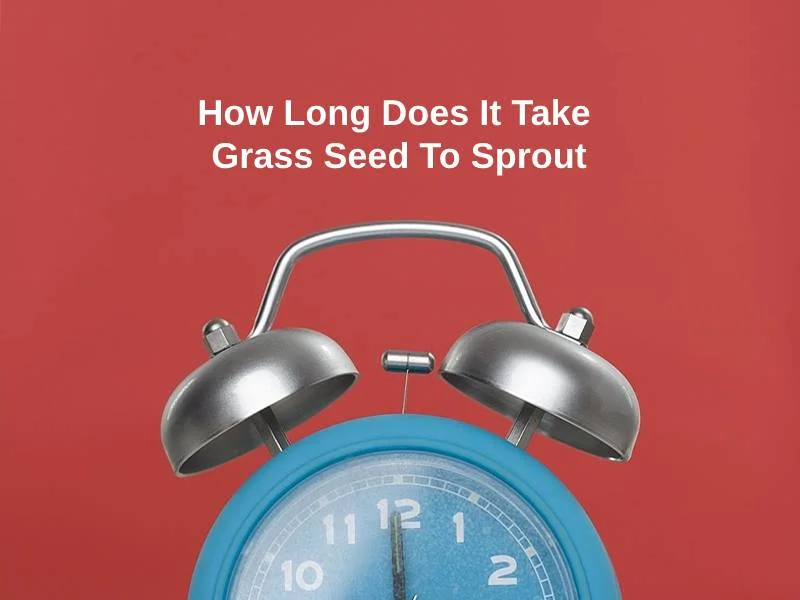Exact Answer: 5 To 30 Days
Grass finds its use in all household landscaping and scenery. While some people opt for fake grass, most of them grow grass from seeds.
When seeding a lawn, it is essential to know how long it will take for grass to sprout. Knowing so can help one plan a timeline for a lawn care regimen and get a lush lawn faster.
Grass can take anywhere from five to 30 days to sprout, depending on the variety.

How Long Does It Take Grass Seed To Sprout?
| Type Of Grass | Time |
| Cold-season grass | 5 to 22 days |
| Warm-season grass | 10 to 30 days |
There are two kinds of grasses- cold-season grasses and warm-season grasses.
Cool-season grasses grow best when the soil temperature is between 50 and 60 degrees Fahrenheit. These grasses grow very fast, and with proper care, they may grow in as little as 20 days.
The fastest-growing cold-season grass, the Annual Ryegrass, takes five to 10 days to germinate. The perennial ryegrass, which is excellent for lawns, takes five to seven days to grow. This variety of grass has a fast germination rate but requires a lot of water to grow.
The Kentucky bluegrass, another variety of clod grasses, grows in seven to 10 days. The bentgrass, on the other hand, needs two weeks to germinate. This grass is present on golf courses.
Other cold season grasses like Tall fescue and Red fescue grow well in seven to 12 and 12 to 22 days, respectively. These grasses require shade and little water to germinate.
As opposed to cold grasses, warm grasses take more time. Warm grasses need soil at a temperature of 60 to 70 degrees Fahrenheit and air temperatures consistently above 80 degrees Fahrenheit to grow. While these grasses may become tall enough to mow in two months, they require up to a year for a dense establishment.
The grass with the fastest growth rate among warm grasses is the bermudagrass, which germinates in 10 to 30 days.
The Centipede grass takes 14 to 21 days to germinate. This variety of grass is low- maintenance and heat tolerant, making it a good fit for lawns in very hot countries like Texas. Another low-maintenance grass variety, the buffalo grass, grows in 14 to 30 days and is a popular choice for turfgrass.
The zoysia grass is a popular drought-resistant variety that handles foot traffic well. It has slow germination, needing between 14 and 21 days.
Why Does It Take So Long For Grass Seeds To Sprout?
The germination of grass seeds depends on various factors. The primary reason for varied growth rates is that different seed varieties grow at different rates. Hard-watering seed mixtures containing ryegrass and red fescue germinate in 5 days. However, the bent and meadow mixture may take up to two weeks to grow.
The time of year is also an essential factor in the germination rate of grass seeds. Cold air and soil can prevent the germination of some varieties. Hence one must avoid planting seeds during this time. A cold spring can delay the germination of grass seeds by up to a few weeks, leaving them vulnerable to being blown away or eaten by birds. Generally, grass seeds must be sowed in mid-late spring and again in early autumn. They then grow in five to 30 days.
The moisture content of the soil is another governing factor. Grass seeds germinate fast in moist soil that’s not too wet or dry. The goal of watering grass is to keep the soil surface moist. Watering with a fine mist spray is the best way to do so. Moreover, this also prevents the formation of puddles on the soil that may inhibit the germination of grass seeds.
Lastly, grass growth depends on the presence of sunlight. If there is plenty of light, grass plants grow fast. If there is too much shade, the lawn will grow sparsely. Therefore, one must ensure that the area receives at least six hours of full, direct sunlight each day.
Conclusion
Everyone wants a good-looking lawn around their homes, but this may not be very easy. The key is to know the germination times of grass seeds, enabling one to plan for a lush lawn. Moreover, planting grass seeds is an excellent budget-friendly way to repair a damaged yard or establish a new one.